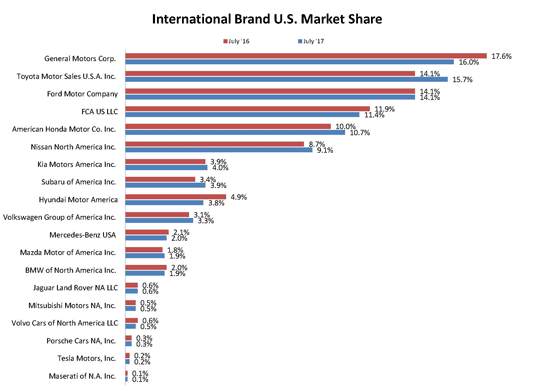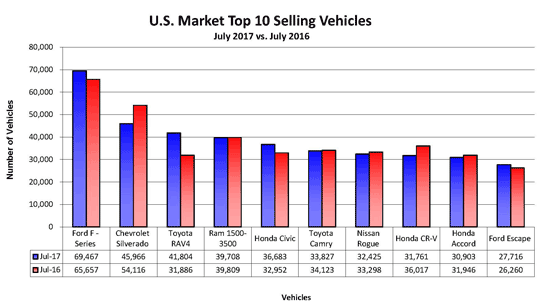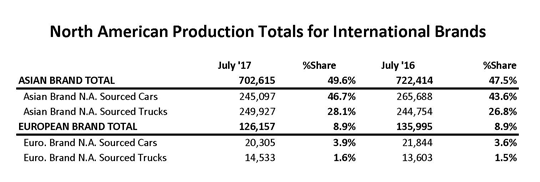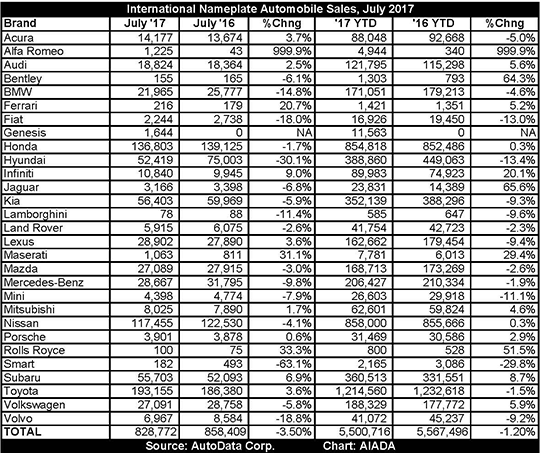AIADA US Import Brands Auto Sales Scoreboard : July 2017 Sales Continue to Stumble
Washington DC August 3, 2017; AIADA released July 2017 sales figures for international nameplate brands in the U.S., which shows that auto sales are now on track for their first decline in volume since the 2008 recession.
Despite the lackluster market, some brands still had reason to celebrate. Subaru saw a 6.9 percent improvement and Toyota sales were up 3.6 percent. While Honda’s sales were down 1.7 percent, its Acura brand improved 3.7 percent.
Of international brands, Hyundai saw the greatest dip in July with a 30.1 percent drop in sales, in part due to a decision to cut fleet sales by 77 percent.
“Dealers anticipate customers will be drawn to their stores this fall by attractive new models and incentives,” said AIADA President Cody Lusk. “We consider a market where consumers are purchasing 16 to 17 million new vehicles a year to be extremely healthy.”
While Industry Slows, Internationals Increase Market Share
Despite the slow-down in overall sales for the month, international brands increased their share of the U.S. market in July, finishing the month with 58.6 percent – up from the 55.4 percent share they captured in June and the 56.4 percent share they held in July 2016. Sales of 828,772 international brand vehicles for the month reflected the slowing U.S. auto market, however. Although they were an improvement from June’s sales total of 816,332 units, they were down from July 2016 when international brands sold 858,409 vehicles.
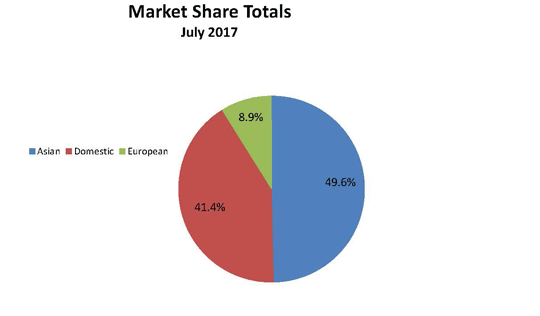
Although they held the biggest share of the U.S. market with 49.6 percent of the market and sales of 702,615 vehicles, Asian brands were down 2.7 percent from last July and 1.6 percent for the year overall. In June they held a 46 percent share of the market, selling 678,171 vehicles, while last July they held 47.5 percent of the market and sold 722,414 vehicles.
European brands were down 7.2 percent from July 2016, but are still up 1.2 percent for the year. In July, they captured 8.9 percent of the market and sold 126,157 vehicles, which was a decrease from the 9.4 percent share of the market and sales of 138,161 vehicles they logged in June. In July 2016 European brands held 8.9 percent of the market and sold 135,995 vehicles.
Domestic brands finished July with 41.4 percent of the U.S. market and sales of 586,367 vehicles – a decline of 11.6 percent since last July and 4.9 percent for the year overall. In June, they captured 44.6 percent of the market and sold 658,028 vehicles, while July 2016 sales reflected a 43.6 percent share of the market and sales of 663,434 vehicles.
Trucks, SUVs Continue to Dominate Among Vehicle Shoppers
Americans continued to flock to trucks and SUVs in July; seven of the month’s top-ten selling vehicles fell into the category, with cars occupying only three slots. The Ford F-Series continued its reign as the most popular vehicle in the U.S. with sales up 5.8 percent over July 2016, followed by the Chevrolet Silverado in second place, which saw a sales decline of 15.1 percent.
The Toyota RAV4 was the month’s winner in the SUV category, logging a third place finish with sales up 31.1 percent over last July. The Nissan Rogue – which was the most popular SUV in June, logging a fourth place finish – fell to seventh place for July with sales down 2.6 percent. In eighth, the Honda CR-V saw sales decrease 11.8 percent, while the Ford Escape slid into tenth place for the month with sales up 5.5 percent.
The month wasn’t all about trucks and SUVS, however. The Honda Civic (fifth place), Toyota Camry (sixth place), and Honda Accord (ninth place) maintained their presence on the list of most popular vehicles for U.S. shoppers.
Global Trade Supports July U.S. Auto Market
International brands continued to demonstrate the importance of global trade as they manufactured over half-a-million vehicles for their U.S. consumers at facilities located across North America. Many of these facilities are located in the U.S. and made by American workers. In July, international brands sourced 529,862 of their vehicles from these facilities, including 245,097 Asian cars, 249,927 Asian trucks, 20,305 European cars, and 14,533 European trucks.





